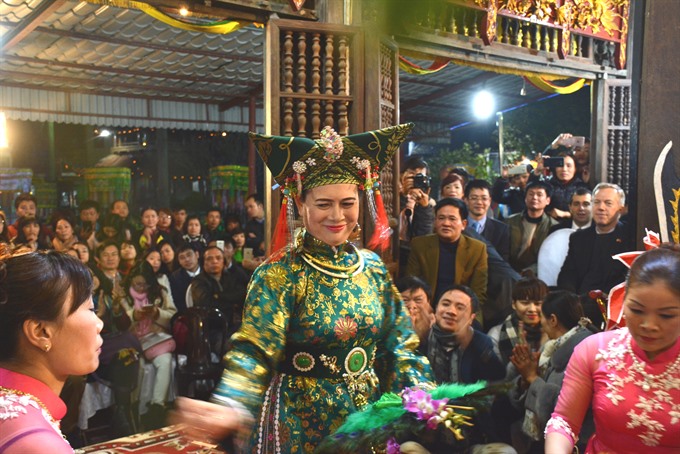 Life & Style
Life & Style

Việt Nam has continued to develop a positive role in UNESCO in 2016, and always endeavours to make substantive contributions to the organisation’s activities, said Lê Hoài Trung, president of the Việt Nam National Commission for UNESCO at a meeting held on Tuesday.
 |
| Spiritual ceremony: Foreign diplomats and local inhabitants watch a hầu đồng performance at the Phủ Dầy Relic Complex in Nam Định province. The Beliefs in the Mother Goddesses of Three Realms, originating in Việt Nam, has been practised in numerous northern mountainous provinces across the nation since the 16th century. —VNS Photo Minh Nhã |
HÀ NỘI — Việt Nam has continued to develop a positive role in UNESCO in 2016, and always endeavours to make substantive contributions to the organisation’s activities, said Lê Hoài Trung, president of the Việt Nam National Commission for UNESCO at a meeting held yesterday.
The commission summarised the work it had undertaken in 2016, and determined the direction for the year to come.
Việt Nam has actively participated in most UNESCO forums, over all of its five sectors including education, natural sciences, social and human sciences, culture, and communication and information.
2016 marks the second year that Việt Nam has assumed two important roles in the UN cultural agency. The country is a member of the UNESCO Executive Board and also a member of the World Heritage Committee which establishes the sites to be listed as UNESCO World Heritage sites. Thanks to its active participation in those forums, Việt Nam could successfully defend the country’s interests and its heritage dossiers.
In December 2016, Vietnamese practices related to beliefs in the Mother Goddesses of Three Realms were awarded a place on the UNESCO Representative List of the Intangible Cultural Heritage of Humanity.
Literature on Huế Royal Architecture is one of two Vietnamese documents that were recognised as world heritages at a General Meeting of the Memory of the World Committee for Asia and the Pacific on May 19 in Huế city.
In September last year, the woodblocks of the Phúc Giang School were recognised as a documentary heritage by UNESCO’s Memory of the World Committee for Asia and the Pacific.
“The contributions of Việt Nam National Commission for UNESCO on multilateral forums of UNESCO have strongly contributed to enhancing the image of Việt Nam and its position on the international scene,” said Trung, who is also deputy minister of Foreign Affairs.
“In 2017, the Việt Nam National Commission for UNESCO will continue to strengthen and enhance the role of Việt Nam in multilateral forums by assuming important roles in UNESCO’s most powerful bodies including the Executive Board, the World Heritage Committee, and in particular the 39th UNESCO General Conference in Paris in November,” he said.
Việt Nam hopes to receive further UNESCO support, especially in the areas of education, and preservation and restoration of heritage sites,
This year, Việt Nam will continue to work on different dossiers for submission to UNESCO for recognition as world heritages.
The country will continue to work on a dossier on the bài chòi singing of central Việt Nam for submission to UNESCO for recognition as an Intangible Cultural Heritage of Humanity.
Việt Nam hopes that various administrative and royal documents under the Nguyễn dynasty (1802-1945) will win recognition as a UNESCO Memory of the World.
Phú Thọ Province will also work to bring Xoan singing out of the list of Intangible Cultural Heritage in Need of Urgent Safeguarding. Xoan singing is expected to be recognised as an Intangible Cultural Heritage of Humanity by 2017.




